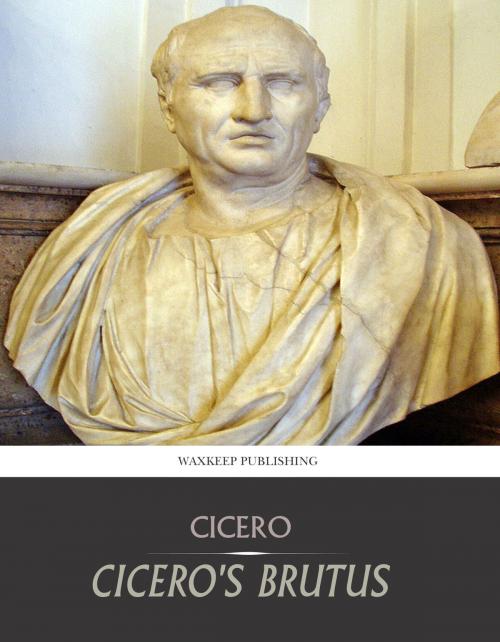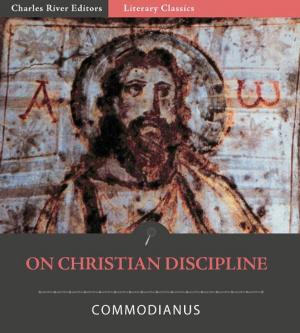Cicero’s Brutus, or History of Famous Orators
Nonfiction, History, Ancient History, Rome, Social & Cultural Studies, Political Science, Politics, History & Theory| Author: | Cicero | ISBN: | 9781508013143 |
| Publisher: | Charles River Editors | Publication: | March 22, 2018 |
| Imprint: | Charles River Editors | Language: | English |
| Author: | Cicero |
| ISBN: | 9781508013143 |
| Publisher: | Charles River Editors |
| Publication: | March 22, 2018 |
| Imprint: | Charles River Editors |
| Language: | English |
“Genius is fostered by energy.” - Cicero
Marcus Tullius Cicero (106-43 B.C.) was one of the most famous Romans in his day, and posterity has been even kinder to him. Cicero was a legend in his own time for his oratory abilities, which he used to persuade fellow Senators and denounce enemies like Catiline and Mark Antony, but he was also one of Rome’s most prodigious writers and political philosophers. Alongside Pericles, Cicero was one of antiquity’s greatest politicians, and he has remained one of the most influential statesmen in history, relied upon by the Romans of his day, political philosophers like John Locke, Enlightenment thinkers like Rousseau, and America’s Founding Fathers. Thomas Jefferson credited Cicero as an inspiration for the Declaration of Independence, and John Adams asserted, "As all the ages of the world have not produced a greater statesman and philosopher united than Cicero, his authority should have great weight.”
While De re publica (The Republic) is his most well known work, Cicero’s letters were also preserved. Cicero’s letters include informal correspondences to friends, as well as long-winding thoughts about political topics that could pass as their own treatises. Nothing escaped Cicero’s attention, indicating the extent to which Cicero kept up with events and how frequently he put his thoughts down on paper. The period covered by the letters of Cicero is one of the most important periods not just for Rome but for the history of the world, and it was covered by one of the most knowledgeable authorities at the time.
Cicero’s works were monumental, but he also happened to live during one of the most crucial times in all of Rome’s history. He was an important Senator during the civil war between Julius Caesar and Pompey, and the side he chose came back to haunt him years later when Mark Antony and Octavian took power in the wake of Caesar’s assassination. Although he was in old age, Cicero himself was ultimately hunted down by the forces of Mark Antony and Octavian and put to death. Antony hated him so thoroughly that he had Cicero’s head and hands displayed publicly in the Forum, a gruesome testament to the fact that Cicero’s words and writings had been so important.
“Genius is fostered by energy.” - Cicero
Marcus Tullius Cicero (106-43 B.C.) was one of the most famous Romans in his day, and posterity has been even kinder to him. Cicero was a legend in his own time for his oratory abilities, which he used to persuade fellow Senators and denounce enemies like Catiline and Mark Antony, but he was also one of Rome’s most prodigious writers and political philosophers. Alongside Pericles, Cicero was one of antiquity’s greatest politicians, and he has remained one of the most influential statesmen in history, relied upon by the Romans of his day, political philosophers like John Locke, Enlightenment thinkers like Rousseau, and America’s Founding Fathers. Thomas Jefferson credited Cicero as an inspiration for the Declaration of Independence, and John Adams asserted, "As all the ages of the world have not produced a greater statesman and philosopher united than Cicero, his authority should have great weight.”
While De re publica (The Republic) is his most well known work, Cicero’s letters were also preserved. Cicero’s letters include informal correspondences to friends, as well as long-winding thoughts about political topics that could pass as their own treatises. Nothing escaped Cicero’s attention, indicating the extent to which Cicero kept up with events and how frequently he put his thoughts down on paper. The period covered by the letters of Cicero is one of the most important periods not just for Rome but for the history of the world, and it was covered by one of the most knowledgeable authorities at the time.
Cicero’s works were monumental, but he also happened to live during one of the most crucial times in all of Rome’s history. He was an important Senator during the civil war between Julius Caesar and Pompey, and the side he chose came back to haunt him years later when Mark Antony and Octavian took power in the wake of Caesar’s assassination. Although he was in old age, Cicero himself was ultimately hunted down by the forces of Mark Antony and Octavian and put to death. Antony hated him so thoroughly that he had Cicero’s head and hands displayed publicly in the Forum, a gruesome testament to the fact that Cicero’s words and writings had been so important.















